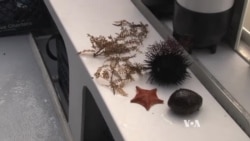On California’s Pacific coastline, volunteers are diving to protect reef ecosystems.
Home to one of the most spectacular marine habitats in the world, the rocky reefs and kelp forests of coastal California's ocean ecosystem are threatened by human population growth, global warming, pollution, and overfishing.
In fact, these same factors have imperiled coral and rocky reefs worldwide, according to the U.S. National Oceanic and Atmospheric Administration.
“I have seen the kelp go from really thick to really, really thin," says Erica Fellins of the international nonprofit Reef Check. "It is important to monitor it."
Fellins and Reef Check are part of a growing "citizen science" movement in the United States. She and hundreds of other volunteer divers are trained to track the health of kelp forests, as well as coral and rocky reefs found around California.
This summer, Reef Check documented a 25 percent decline in two dozen different fish populations since 1970.
Citizen scientist Stephen Campbell, who monitors the rocky reefs around the Channel Islands, off the coast of Santa Barbara, says the health of a given reef can provide critical information about the large marine ecosystem.
“Reefs are really sensitive to temperature and ocean acidity," he says. "So, with global climate change happening, you having rising sea levels happening, warmer water, and increased acidification. It just serves as a proxy for marine health.”
The Channel Islands are a Marine Protected Area, which means people can dive, kayak, or snorkel in the area, but fishing is prohibited during certain times of the year. Volunteers monitor reef conditions year round, noting, for example, any changes in its size or shape.
“You are characterizing the relief of the reef, which is like the variation in depth along the transects," says Campbell. "And you are also characterizing what is on the reef. So it might be algae, invertebrate, or there might not be anything. So you note that down, and the last thing you're characterizing is if it's reef, cobble, boulder, or sand. And that is just how coarse the grains are.”
Reef Check works with non-profit organizations and government agencies. With more than 1600 kilometers of coastline to cover, rough seas, and limited government staff for underwater surveys, Campbell and the other citizen scientists are filling a gap.
“In California, doing things like this, surveying the reefs so we know what the reef diversity is, and then giving that data to people in management and policy so they can actually use the data and say, ‘We need to protect these areas if species diversity is declining,'" he says. "I think that is sort of catching on now."
He said California is at the forefront of preserving marine ecosystems.
Despite the decline in fish life, a recent report from Reef Check also revealed encouraging signs of recovery in California’s network of Marine Protected Areas.





